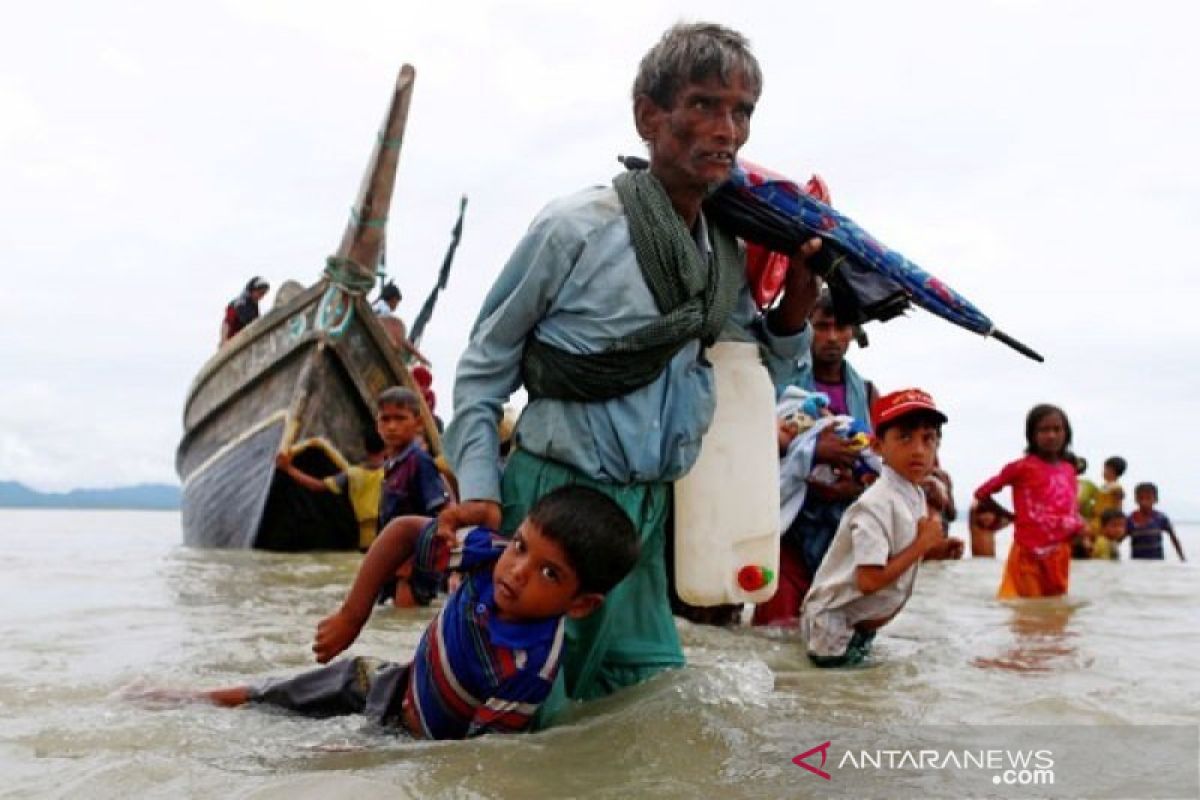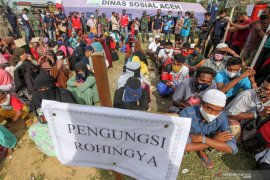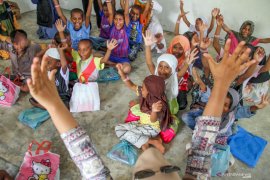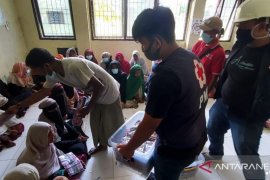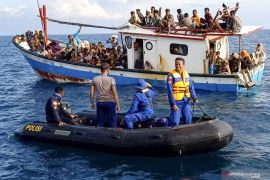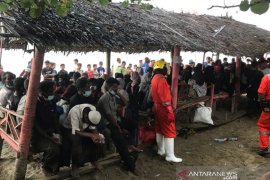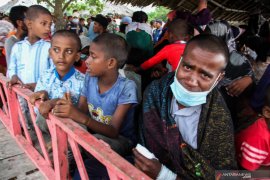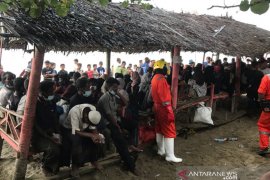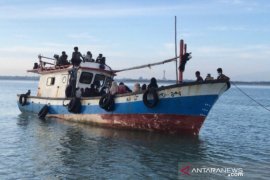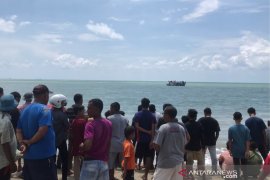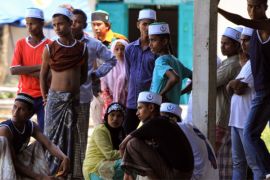We are increasingly concerned by reports of failure to disembark vessels in distress and of the grave immediate risk this poses to the men, women, and children on boardBekasi (ANTARA) - Almost all nations are currently reeling from the impact of COVID-19, the disease caused by a newly discovered coronavirus, which has infected nearly three million globally.
To slow down and halt the spread of the deadly disease, each country has tightened border controls.
Even as countries strive to thwart the spread of the new coronavirus, hundreds of Rohingya refugees are left stranded at sea in the Bay of Bengal and Andaman Sea, as nearby countries closed the door to them.
On 16 April 2020, Malaysian maritime authorities pushed back some 200 Rohingya refugees arriving aboard boats over fears of the spread of COVID-19.
Furthermore, on April 23, 2020, the two boats reached the Southeastern coast of Bangladesh, but Foreign Minister A.K. Abdul Momen blatantly stated that Bangladesh could no longer allow entry to Rohingyas.
“Our position is clear. Not a single Rohingya will be allowed to enter. Any trawler carrying Rohingya that tries to enter Bangladesh will be resisted,” local coast guard commander, Lt Cmdr M. Saiful Islam, staff officer of the Coast Guard’s Chittagong East Zone, told BenarNews.
Speaking in connection to the scenario of trawlers carrying Rohingya being refused entry to Bangladesh, Representative of Indonesia to the ASEAN Intergovernmental Commission on Human Rights (AICHR) Yuyun Wahyuningrum stated that the Rescue Coordination Centre (RCC) or similar agencies, in collaboration with corresponding authorities of ASEAN member states, should immediately launch a search and rescue operation to help the trawlers carrying Rohingya refugees and asylum-seekers in the Bay of Bengal and Andaman sea.
It is not only a moral imperative but also humanitarian and human rights responsibilities. The ASEAN has its tools ready, Wahyuningrum affirmed.
In 2010, ASEAN member states had committed to ensuring timely assistance to persons and vessels in distress at sea as outlined in the ASEAN Declaration on Cooperation in Search and Rescue of Persons and Vessels in Distress at Sea.
This Declaration also highlights the significance of developing coordinated regional approaches, including operational mechanisms and communication systems to prepare for and ensure a rapid and effective response to distress situations.
Accordingly, it is crucial that ASEAN and its member states adopt all requisite measures to bolster their shared responsibilities to address the maritime movements of refugees and asylum-seekers in the Bay of Bengal and Andaman Sea.
To this end, the ASEAN can prepare humanitarian funds to help those distressed at sea.
Moreover, the right to seek asylum is guaranteed under Article 16 of the ASEAN Human Rights Declaration.
In the wake of the COVID-19 pandemic, saving lives, especially of those seeking assistance, should be the focus of our quick responses.
On 23 April 2020, the UNHCR had stated that it stands ready to support governments to facilitate disembarkation procedures and quarantine measures to ensure that public health issues are addressed.
“I take a note that Indonesia has repetitively expressed its concern over the plight of the Rohingya and their desire for constructive engagement through the ASEAN to solve the crisis and to demonstrate a pathway for individual states to lead a more coordinated regional response,” she stated.
“Let us also remember that in the previous two consecutive Summits in 2018 and 2019, the ASEAN heads of state and governments have reiterated the need for a comprehensive and durable solution to address the root causes of the refugee crisis, which can only be successful if they feel secured and their human rights are respected, protected and fulfilled,” she affirmed.
"Finally, I call on the ASEAN to put in place measures to stop these incidences and prevent them from recurring," she stated.
Developing national and regional refugee protection frameworks will play a crucial role in reducing uncertainty and facilitating more effectual responses to future crises.
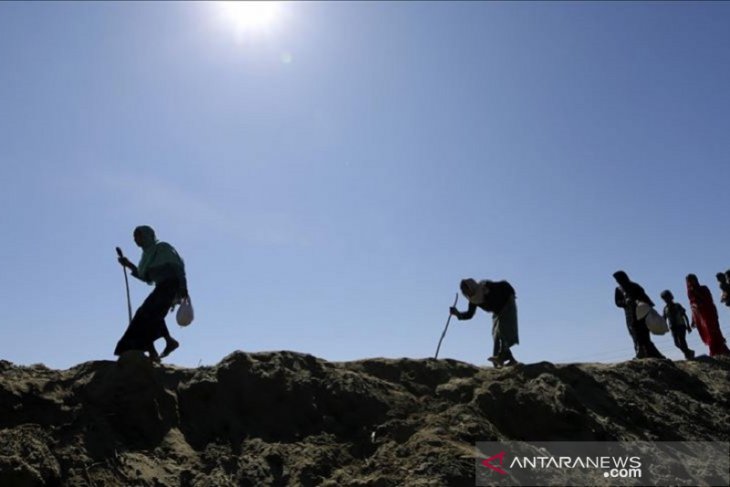
"We are increasingly concerned by reports of failure to disembark vessels in distress and of the grave immediate risk this poses to the men, women, and children on board," the Director of the Regional Bureau for Asia and the Pacific at the UN Refugee Agency (UNHCR) emphasized.
Search and rescue, along with prompt disembarkation, are life-saving acts. The dire – and, in several cases, fatal – predicament of thousands of refugees and migrants in the Bay of Bengal and Andaman Sea in 2015 ultimately demonstrated the critical, humanitarian imperative for solidarity and joint action to address threats to life at sea. The 2016 Bali Declaration embodied these principles and outlined the way forward to prevent another crisis in the Andaman Sea. "We must not return to such life-threatening uncertainty today".
In the context of the unprecedented current COVID-19 crisis, all states must manage their borders as they deem fit. However, such measures should not led to the closure of avenues to asylum or force people to return to situations of danger. The UNHCR stands ready to support governments in applying responsible disembarkation procedures and quarantine measures to ensure that public health issues are addressed.
The challenge of irregular movement is not unique to Asia. Refugees and asylum-seekers move through unofficial and often inherently risky channels since it is the only option available to them. The reality for several refugees is that persecution and threats to their lives and well-being are more immediate than COVID-19.
The UNHCR notes and is encouraged by the ASEAN’s clear commitment to joint action and a whole-of-society approach in the context of COVID-19. Leaving no one behind is the only lasting means of ensuring that all collectively beat this global challenge, and we are all only as strong as our most vulnerable members.
Saving lives at sea must be a combined effort, in which any one state that rescues and disembarks refugees can draw on resources pooled from other states in the region.
Predictable disembarkation and safe pathways for refugees in distress strengthen public health by ensuring that regardless of the manner of arrival, people undergo appropriate health screening. It safeguards prevention measures rather than risking that people will instead seek clandestine points of entry without undergoing proper quarantine procedures.
Rescue at sea and allowing the persecuted to seek asylum are fundamental tenets of the customary international law, by which all states are bound.
Beyond the current COVID-19 crisis, a predictable and humane disembarkation approach will remain critical. The UNHCR is calling on all states to uphold these life-saving obligations to refugees and asylum-seekers.
Close
EDITED BY INE
Editor: Fardah Assegaf
Copyright © ANTARA 2020
